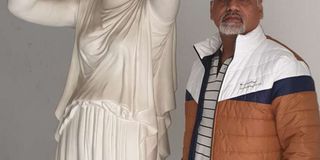Firm using technology to transform housing sector

What you need to know:
- On the other hand, they have also specialised in building flooring design known as stamped concrete.
- Firm using technology to transform housing sector interior flooring.
- Stone Arts Kenya has sister companies in India and Cameroon and have recently diversified into Rwanda and Uganda.
Amid the growing craze for aesthetically pleasing residential and office spaces, property developers are now embracing new technologies to stand out and have a competitive edge.
Stone Arts Kenya founder and director Pankaj Sakhuja, however, recalls that the successful completion of the Australian High Commission Nairobi offices project has helped raise the profile of his company.
“Since the conclusion of the project, there has been a big demand for what we do in the market. We get people referred to us by other clients after seeing the quality of our work,” he told the Nation.
INNOVATIVE SOLUTION
Driven by the need to provide an effective and innovative solution for construction professionals, Stone Arts Kenya has carved a niche in dry cladding.
Instead of using cement, dry cladding involves the use of sandstone as the cladding material while stainless steel clamps are used to hold them into place.
Also known as mechanical clad- ding, the company has, among others, developed state-of-the-art designs for high-rise buildings, fireplaces, fountains and water features for personalised spaces.
On the other hand, they have also specialised in building flooring design known as stamped concrete. This is a type of concrete that is patterned or embossed to resemble brick, slate, flagstone, stone, tile, wood and various other patterns and textures. This is commonly used for sidewalks, driveways, pool decks and
The firm is using technology to transform housing sector interior flooring. In order to cope in this very competitive market, Mr Pankaj noted, they have to understand the needs of their clients and execute projects which guarantee quality and safety.
“One of the greatest ad- vantages of dry cladding is its safety. The likelihood of stone falling down over the years is remote,” he said.
STONE CLADDING
The method of fixing mechanical stone cladding also allows for the contraction and expansion of stone during the hot and cold seasons.
Most of Stone Arts Kenya claddings are UV and water proof, which means they can be used for both interiors and exteriors. The company offers a wide selection of natural stone products including granite, sandstone, lime- stone, slate, travertine and marble. The natural stones are imported from many geographical regions in India, Turkey and Europe.
“All our colours are imported from Germany and therefore do not crack or fade due to exposure to sunlight or too much washing,” noted Mr Sakhuja. The company that has employed 75 people in Kenya, has an office in Westlands and a factory in Ngong where they fabricate stone building materials and stone garden ornaments, fountains, planters and architectural stone in traditional, classical and contemporary styles.
“Given that most of the claddings available in our display are locally made in our factory. We have a variety for different price ranges to fit everybody’s pocket,” Mr Sakhuja said.
Stone Arts Kenya has sister companies in India and Cameroon and have recently diversified into Rwanda and Uganda.





